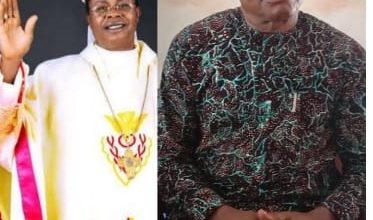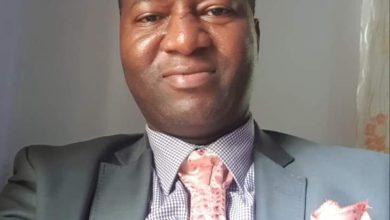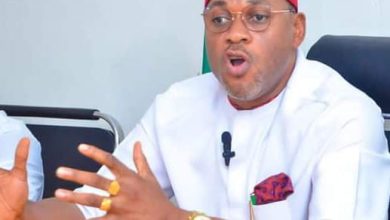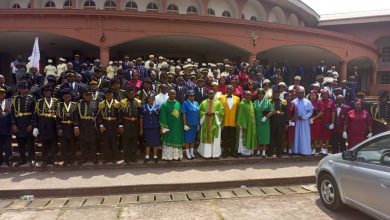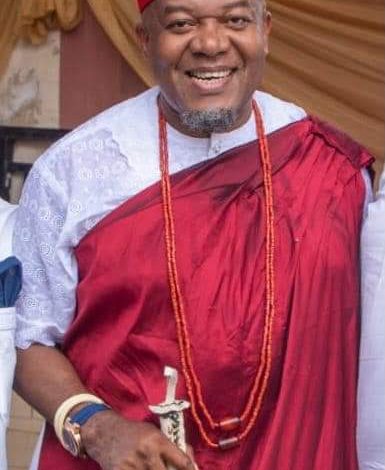
Title Taking In Igboland
By Uche Nworah, Ph.D
In this instalment of Igbo Culture Knowledge Series (ICKS), we take a peep inside the age old, time honoured Igbo tradition of titles, and title taking.
Many who argue that omenani Ndigbo is gradually dying will be glad to know that Igbo culture truly lives and still thrives, through our language, culture, festivals, beliefs, and also through the taking and bearing of titles, the sobriquet that ultimately takes over an Igbo man’s given names.
Titles could be given, or are taken to reflect the character of the title bearer or holder. In some cases, the titles are just symbolic, and become a mere form of greeting during social interactions. In typical Igbo communities, people are not known, called or greeted by their given names, but rather by their titles. Some of these titles are self-explanatory, but many may require hard thinking to fully understand their meanings, but still each title signifies something or else it becomes a mere nickname.
The titles are a deep reflection, and an extension of another aspect of Igbo culture, that of speaking in parables or communicating with proverbs. Just like the proverbs which are not expected to be translated else as Ndigbo would say, it would be deemed that the bride price paid on behalf of the mothers of the persons requiring translation of the proverb is in vain. The meanings of titles are not meant to be interpreted either by the title bearers, especially to fellow Ndigbo. An exception of the rule may be applied if the persons/people requiring interpretation are non-Igbos.
In Igbo land, titles could be either assumed without any ceremony, or taken through elaborate feasting and fulfilment of other conditions. People who prefer the former, bearing of titles without a formal process of ‘isacha afa’, are often referred to as ‘anoli’. Hence Ndigbo would often say that there are titles and there are titles whenever they wish to mock an anoli or ofeke who they feel has not merited the huge or bogus title he or she bears.
The Igbo man by tradition is expected to bear a title, either given to him by his father or one that he assumes and takes up himself. However, there are titles that one can only bear after going through some traditional rituals and practices such as Nze na Ozo, Ichie, Chieftaincy or other Igbo traditional titles. Anyone who successfully goes through the stipulated processes would have been considered to be fully initiated, and his peers will no longer have any inhibition in giving him the traditional Igbo 3 – back hand salute and hand shake (ina ito) – a social greeting ritual that is reserved only for the initiated.
During formal title taking events, the titles are symbolised through sticking a feather or feathers in red caps and then placed on the recipients head, by hand beads (aka) made out of elephant tusks or beads, or by a piece of woven thread tied to the title takers ankles (ata). Title holders may also be presented with a specially carved working stick (Mkpo), or a metal staff (ngwu agirigai) in addition to a fan made out of animal skin (akupe) with the person’s name and title engraved on it. Women receive thick arm bracelets carved out of elephant tusks (Odu).
It is customary to hear Ndigbo making expressions such as Ichi zu lu echi zu; such people (the initiated) are accorded more respect within their communities and have more opinion in traditional matters including traditional marriages etc. They may also have a say during land disputes, especially if such a community has no constituted Ojiani group.
During feasts and other ceremonies, the fully initiated title holders are rewarded with extra portions of thighs of goat or tubers of yam and other items, and their food which must include pounded yam and soup stocked with anu mkpo and azu mkpo are usually prepared separately by umu nwanyi di ocha. At events, titled men do not eat openly, they are taken inside an enclosed place to eat.
Although there is no general expectation for people to formalise their titles, there is however a class system within the Igbo cultural system. More respect and honour are accorded to those who have formalised their titles. The act of formalising one’s title is indeed not something for weak hearts and requires some elaborate preparation which culminates in series of events. The title holder will be expected to fulfil certain conditions including feasting his umunna, umuada, initiated title holders and other relevant stakeholder groups in the community.
In the olden days, such feasts will cost lots of cowries, manilas and shells. It would require regular trips to the village market where the cowries will be exchanged for goats, tubers of yams, jars of nkwuenu and other food items. Depending on the title being taken, it may sometimes involve wrestling with (killing) a lion or any other task that may be assigned by the custodians of Omenani. Fable has it that bearers of the Ogbuagu title, maverick politician Francis Arthur Nzeribe’s title would normally be expected to have either wrestled with a lion, or killed one with a spear, they would then peel the dead animals’ skin which would be dried and hung in the title holder’s Obi as evidence. Many would have lost their lives during this process but for those that succeed, the honour and respect they receive afterwards makes it worth it as their stories are told far and wide. In the end, such people are applauded and congratulated by all, including the initiated and non-initiated for as Ndigbo would say Odiro Ofele.
Some titles are also hereditary, passed on from generation to generation, in such cases, while all the male children born to a family may be addressed commonly by such titles by which their father or grandfather was known as, in the long term, it is only the eldest male child that eventually retains the title. Preference in this instance always goes to the first-born son. The younger siblings will be expected whenever they can, to assume or take their own titles.
In Igbo land, there is no compulsion by any native law or custom for men or women to bear titles; however anyone who does not may find himself being the odd person, or butt of jokes at age grade, community or village square meetings, and during other community festivals and events where people are only addressed by their titles.
The culture of titles in Igbo land has often been chided by certain commentators who call it a craze, but in fairness there is nothing wrong with it. By doing it, Ndigbo are only trying to uphold their tradition, just like other cultures would in other ways. On the subject of titles in Alaigbo, Charles Ikechukwu Okoli, an Awka indigene who goes by the traditional title of Nwa Ezeoku says that it is good that the Ndigbo have carried on with the practice, “Perhaps an aspect of this that Ndigbo should look at is in the abuse of titles, which sometimes sees less deserving members of the society being rewarded with big titles. Such practices usually send the wrong signals to the younger generation”, he concludes.
Some Igbo titles offer a mirror or parody into life, especially when the titles are juxtaposed with the personal circumstances of the bearers. A few ones come into mind here especially titles that suggest that the bearers are people of great financial and material means but in reality they may not be, examples include such grandiose titles such as Udu ako mmiri, Aku n’ata ka si, Okpata ozuo oha, Akuluouno, Ide ji ogwugwu, Ono n’ikpo aku, Ide, Eselu enu ego, Eze ego etc.
Titles can also help to restrain people from taking certain actions, or condition them towards behaving in certain ways. For example I have found that my title Ezeudo (translated, this means King of Peace, or Peacemaker), has on several occasions served to restrain me from acting when provoked. It serves as a reminder to me always to ‘watch it’, else I will be ridiculing myself, title and culture.
Some titles are also aspirational, and serve as profession of faith in what is to come, or happen in their lives in the future. For example, ‘Nwata ana ayo eze’, ‘Ochinanwata’ etc.
I know a man who goes by the title of Ome mgbe oji, in retrospect I think that the title is quite befitting, a very clever chap he is as his title forecloses any expectations relatives may have of him for financial assistance, he would make promises but with a clause that the promises can only be fulfilled whenever it is possible, a clever title indeed.
There are also absurd cases, for example when known charlatans or cowards in the community bear titles that may be considered too big for them such as Ochi agha, Ekwueme, Dike ana agbara izu, Aka gbajiri igwe, Dike eji eje mba. In some other cases, some titles may be considered vain in an increasingly modern Igbo society which has largely embraced Christianity, such titles connote the impression of idol worship for example titles such as Agbara ahuru gbuo okuko, Alusi n’ejere onye nwe ya ozi, Eze Udene etc.
As with men, so also with women, there is no evidence of discrimination against women in the Igbo culture with regards to title taking, in fact the women are holding their own and giving the men a run for their titles. They do have their class system as certain titles can only be taken by the initiated, usually into the much revered and influential Iyom society. If you are an Igbo woman looking for a title, perhaps the following may get you thinking; Osodieme, Agbala nwanyi, Oche eze, Mkpulu nma, Nwanyi gbue efi, Asa mpete, Nwanyi ma uche di ya, Ugogbe, Ola edo, Ada eji eje mba etc.
Interestingly, men and women do not normally bare similar titles in Alaigbo as they would some Igbo names such as Uche, Ngozi, Chinyere, Chika and Udodiri which are unisex names, but it does seem from the sound of some Igbo traditional titles, that both the women and the men already know which titles they could bear and which is exclusive to the opposite gender.
Ndigbo are also very accommodating and have been known to show their appreciations of friendships and beneficial relationships with other races through the bestowing of honourary titles. Some Igbo In-laws are known to have bagged titles such as Nwanne di n’mba.
Many prefer keeping just one title, while others prefer taking a new title for each traditional event, or Chieftaincy title they are taking from different communities. For example, my traditional title of Ezeudo was adopted during my Nze Enugwu-Ukwu initiation in December 2011. I still retained the same Ezeudo title by choice when the traditional ruler of Abagana (Igwe Mbamalu) honoured me with a Chieftaincy title in December 2016. I did the same when the traditional ruler of my community, Enugwu-Ukwu (Igwe Ralph Obumnaemeh Ekpeh honoured me with a Chieftaincy title in January 2019, and enrolled me into the Enugwu-Ukwu traditional cabinet.
Afa otutu (titles) will continue to play prominent roles in the cultural and social lives of Ndigbo, and no matter who you are; Onye Igbo, Ogo, or enyi Ndigbo – Zelu nke ichiri!
Notes
The author is grateful to all those who provided insights on the subject of titles in Igbo land, particularly the author’s late father Nze Edwin Nwora (Nka ona adi), The author accepts that he may have made certain generalisations and assumptions in the article which may not apply to certain Igbo communities but believes that such generalisations would not impact greatly on the accuracies, nor take way from a full appreciation of the issues of titles in Igbo land. The author hopes that this article will encourage Igbo studies and promote understanding of Igbo culture especially amongst the younger Igbo generation.
Word Glossary
Alu – Sacrilege or abomination
Afa otutu – Title
Alaigbo – Igbo land
Alusi n’ejere onye nwe ya ozi – The deity that does the bidding of its owner
Agbara ahuru gbuo okuko – The deity that triggers the killing of a hen (n allusion to a person’s supposed ‘great’ standing in the society)
Agbala nwanyi – An elegant and powerful woman
Ada eji eje mba – A daughter/woman that can be relied on in far and near places.
Asa mpete – A beauty
Akuluouno – Only repatriated wealth are safe.
Aku n’ata ka si – A ‘money-miss-road’ (one in possession of excess wealth)
Aka gbajiri igwe – the strong hand that bends the iron
Dike eji eje mba – A warrior that could be taken on journeys to other lands (one who is to be trusted, brave and courageous)
Dike ana agbara izu – A brave man and warrior that enemies conspire against
Ezeudo – King of peace or someone that makes/likes peace.
Ekwueme – One whose word is his bond (‘talk-and-do’ in popular parlance)
Eze Udene – The king vulture (Vultures supposedly signify bad omens in Alaigbo)
Eselu enu ego – The Literary meaning is to peel off a slice from a cash bundle or pile, but is actually an allusion to the fact that what the title bearer is spending is still ‘chicken change’ to his overall worth.
Eze ego- King of money (this title is no longer popular in Alaigbo since the death of Victor Okafor, an alleged 419 kingpin who made the name very notorious)
Ichi zu lu echi zu – You are fully initiated.
Ide ji ogwugwu – Wealthy stronghold
Ide – wealthy person
Ichie – a revered title for elderly men in the community
Ina ito – A special form of greeting in Alaigbo, requiring 3 back hand slaps and a hand shake. The uninitiated are not expected to be greeted in this manner.
Iyom – A revered society of women requiring initiation.
Omenani – Culture or tradition
Obi – A small outpost in a compound usually used in receiving visitors.
Ola edo – This means gold but is used to adulate the tile holder as being precious.
Ogbuagu – A traditional title. The literary meaning is killer of lion.
Okpata ozuo oha – A person who extends his wealth to others.
Ome mgbe oji – He who does, or helps out when he is able to
Ojiani – Overseers of community lands and traditional holders of title deeds, they have the last say in land disputes in most Igbo communities and were very powerful in the days when there were no law courts.
Odiro Ofele – It is not easy at all (no mean feat)
Oso di eme – The husband’s helper
Oche eze – The throne of royalty
Ofeke – A wayward person
Ochi agha – Battle commander
Ono n’ikpo aku – He who dwells in wealth
Mkpulu nma – Epitome of beauty
Nwanyi ma uche di ya – A loyal woman who knows and respects her husband’s heart desires and wishes
Nze na Ozo – A highly revered ancient Igbo traditional society
Ndigbo – Igbo people
Nwa Ezeoku – A child from a wealthy man/family
Nwanyi – Women
Nka ona adi – The rightful place (Things never cease to be where they belong)
Nkwuenu – Undiluted Palm wine (known as ‘Upwine’ in local popular parlance)
Nwanyi gbue efi – The literary translation means a woman that has killed a cow (or caused one to be killed), because cows are expensive in the old days, women who achieve such feat are very much revered. In modern usage, it means a woman of mean.
Nwanne di n’mba – The relative in a foreign land
Nke onye chiri, ya zaa – May each answer to his/her title
Umunna – Kindred relatives
Ugogbe – Mirror
Udu ako mmiri – The earthen pot that is always full of water
Umuada – Women born within a particular community or kindred
Anu Mkpo – Dried roasted meat
Azu Mkpo – Dried roasted fish
Umu nwanyi di ocha – (Clean women) Women who are not in their menstrual cycle.

